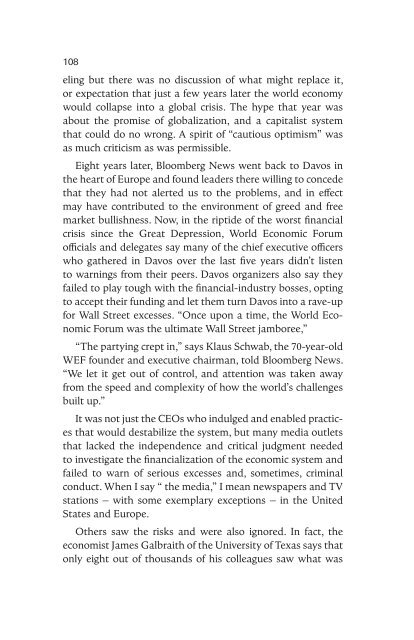Create successful ePaper yourself
Turn your PDF publications into a flip-book with our unique Google optimized e-Paper software.
108<br />
eling but there was no discussion of what might replace it,<br />
or expectation that just a few years later the world economy<br />
would collapse into a global crisis. The hype that year was<br />
about the promise of globalization, and a capitalist system<br />
that could do no wrong. A spirit of “cautious optimism” was<br />
as much criticism as was permissible.<br />
Eight years later, Bloomberg News went back to Davos in<br />
the heart of Europe and found leaders there willing to concede<br />
that they had not alerted us to the problems, and in effect<br />
may have contributed to the environment of greed and free<br />
market bullishness. Now, in the riptide of the worst financial<br />
crisis since the Great Depression, World Economic Forum<br />
officials and delegates say many of the chief executive officers<br />
who gathered in Davos over the last five years didn’t listen<br />
to warnings from their peers. Davos organizers also say they<br />
failed to play tough with the financial-industry bosses, opting<br />
to accept their funding and let them turn Davos into a rave-up<br />
for Wall Street excesses. “Once upon a time, the World Economic<br />
Forum was the ultimate Wall Street jamboree,”<br />
“The partying crept in,” says Klaus Schwab, the 70-year-old<br />
WEF founder and executive chairman, told Bloomberg News.<br />
“We let it get out of control, and attention was taken away<br />
from the speed and complexity of how the world’s challenges<br />
built up.”<br />
It was not just the CEOs who indulged and enabled practices<br />
that would destabilize the system, but many media outlets<br />
that lacked the independence and critical judgment needed<br />
to investigate the financialization of the economic system and<br />
failed to warn of serious excesses and, sometimes, criminal<br />
conduct. When I say “ the media,” I mean newspapers and TV<br />
stations – with some exemplary exceptions – in the United<br />
States and Europe.<br />
Others saw the risks and were also ignored. In fact, the<br />
economist James Galbraith of the University of Texas says that<br />
only eight out of thousands of his colleagues saw what was
















